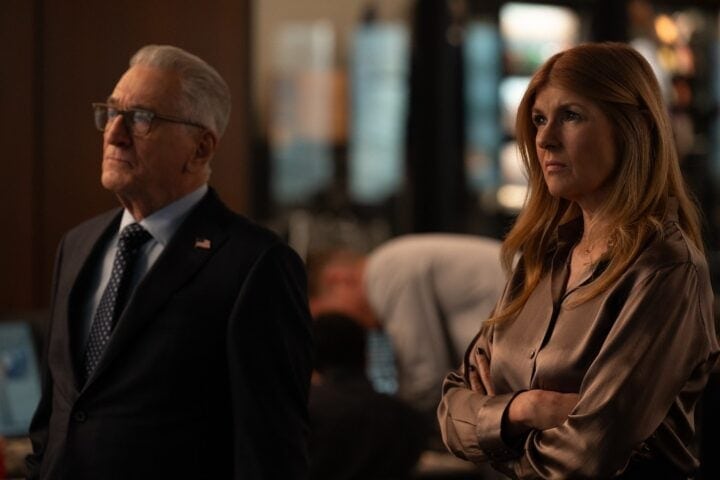In the famous “Church and State” episode from Succession’s penultimate season, Kendall Roy eulogizes his father with a speech acknowledging the man’s brutality while celebrating the “magnificent, awful force of him,” the “vim” that made the world a more interesting place to be. Netflix’s adaption of Tom Wolfe’s A Man in Full tries to conjure that same sort of figure with its central character: Charlie Croker (Jeff Daniels), a powerful, complicated businessman whose flaws are glaring but whose gravitational pull is undeniable. But Charlie lacks the vigor to live up to that description, and so does the series that revolves around him.
Daniels plays Charlie with a slurring Southern accent that makes him sound like he’s speaking through ill-fitting dentures. Charlie is a college football star turned real estate mogul, and something of a kingpin in Georgia. He owns a vast business empire, presiding over it from the top floor of a dazzling skyscraper he had built as a great, phallic monument to his importance. But now his kingdom threatens to come crashing down around him.
Created by David E. Kelly and directed by Regina King, A Man in Full begins as Charlie is called into a meeting led by one of his vengeful ex-employees, Raymond Peepgrass (Tom Pelphrey), and Raymond’s new boss, Harry Zale (Bill Camp). They represent one of the banks to whom Charlie owes an astonishing amount of money and they’re here to collect, leaving Charlie staring down the barrel of bankruptcy. The meeting quickly descends into a full-blown shouting match, offering us the first of many scenes in which characters bellow insults at one another.
While it apes Succession’s mixture of elaborately constructed barbs and double-barreled vulgarity, the show’s writing is rarely sharp enough to make these face-offs entertaining. It’s all punchlines with no real impact—zingers with no zing. Often, the series will make a point of clearing space for the next one-liner, only for the joke to fall relatively flat: In the opening standoff, for instance, Harry painstakingly builds up to a gag about how their meeting will be like a cactus once Charlie leaves because then “all the pricks will be on the outside.”
The series also has a habit of repeating itself. We’ll get to see this same confrontation between Charlie, Raymond, and Harry play out twice more, in the very same room, with no meaningful new ground made. Converting a 700-odd-page book into a six-episode series is no easy task and you can feel A Man in Full struggling in these moments.
The rest of the series sees Charlie desperately trying to come up with a scheme to stay on top. He continually laments a society that “won’t let him be himself” and rues his existence as a dying breed, the last of the world’s real men. We hear characters like Raymond talk about Charlie in the same terms—a great and terrible figure, one who inspires both admiration and revulsion.
But the character we see on screen never really merits either reaction. There’s no great presence to Charlie, no aura of real power, but also nothing especially odious. There are times when Daniels’s charisma manages to make it through the mushy accent and sluggish script, but these moments are few and far between. Where we needed a man in full, we get an empty suit.
While Charlie battles through the boardrooms, another plotline follows an employee named Conrad (Jon Michael Hill), who’s been imprisoned following an altercation with the cops. The case soon attracts the interest of both Charlie’s lead attorney, Roger White (Aml Ameen), and the local mayor, Wes Jordan (William Jackson, effortlessly flitting between the character’s gregarious public persona and his decidedly less compromising private one).
It’s easy to see the thematic tissue that’s supposed to connect these two storylines. They feature two men—one rich and one poor, one Black and one white—put through the system in very different ways. But the series never effectively draws these two strands together or contrast the characters’ experiences in a meaningful way. Conrad’s subplot ends up existing largely as a legal/prison drama that happens to be occurring at the same time as Charlie’s.
A Man in Full opens with voiceover narration from its star, a famous actor playing a ruthless operator with a drawling accent, and even before the camera dawdles on Charlie’s signet ring, there’s a sense that the series wants to be something akin to House of Cards. For a series that features a Trump-esque tycoon in a tale of police brutality, though, A Man in Full has little to say about any facet of America. Instead, it seems Wolfe’s novel was just another piece of IP that could be fed into Netflix’s content-creating machine, churning out something that seems vaguely prestigious, just so long as you don’t look too closely.
Since 2001, we've brought you uncompromising, candid takes on the world of film, music, television, video games, theater, and more. Independently owned and operated publications like Slant have been hit hard in recent years, but we’re committed to keeping our content free and accessible—meaning no paywalls or fees.
If you like what we do, please consider subscribing to our Patreon or making a donation.







This review seems mostly a delivery mechanism for a moderately clever line: When we needed a man in full, we [get] an empty suit.
This was not my experience at all. Having seen and read other Tom Wolfe stories plus being aware of the controversy of a New Yorker writing about the South, an area and a culture not native to him… I had certain expectations. I also had hopes for the updated adaptation which were largely met, the novel being written in 1998.
The performances were superb. The differences in how the men each handled hubris and either dug in or dug themselves out was clearly presented as was the complicated effect of both class and race.
Altogether quite a successful effort that retained some of the style of the source material. Again, a terrific cast!